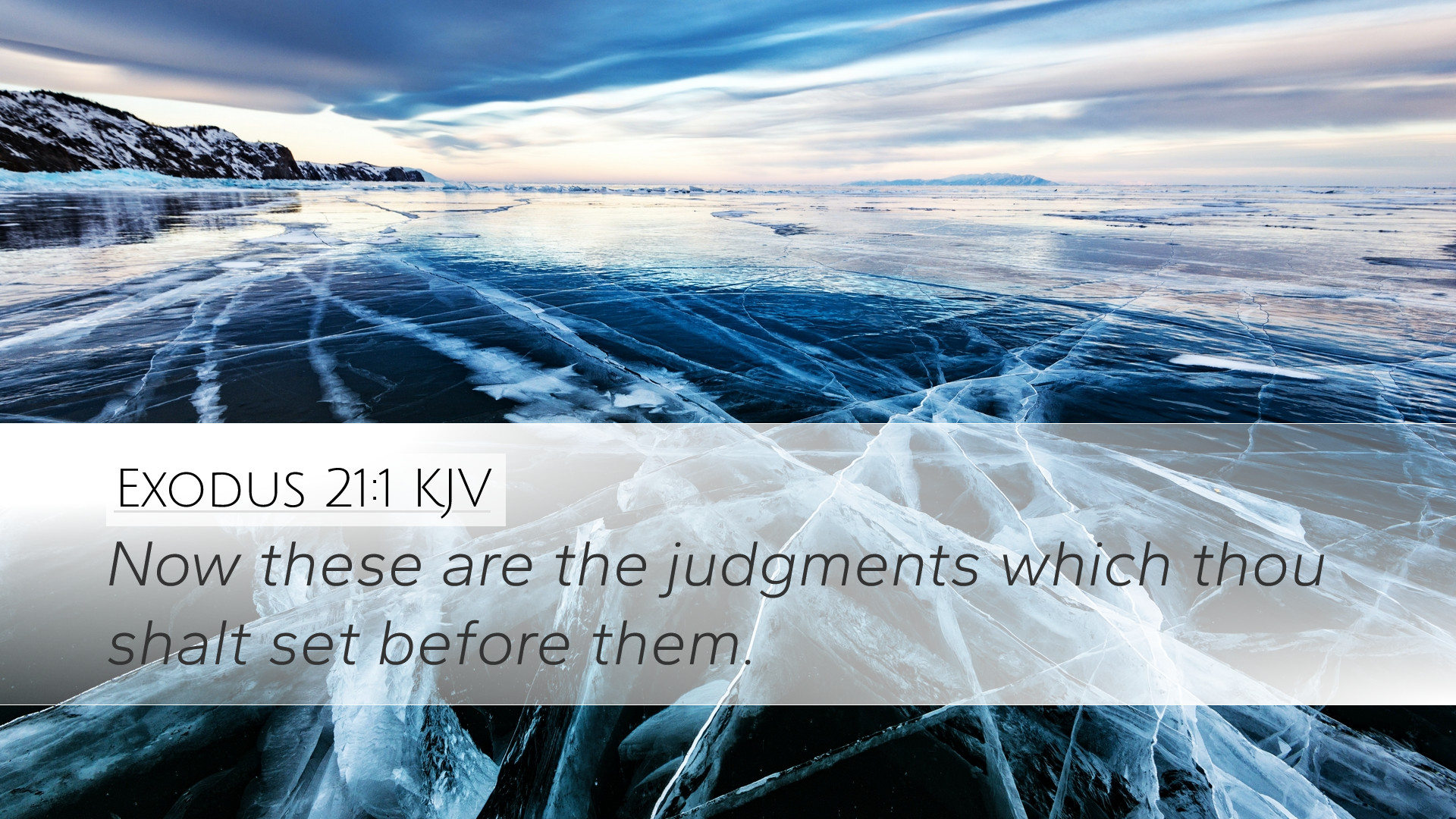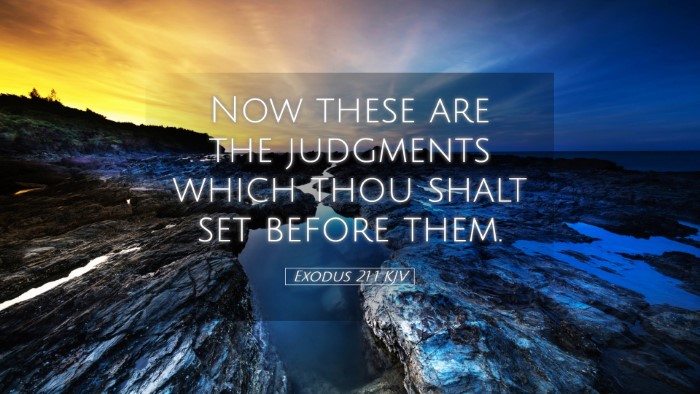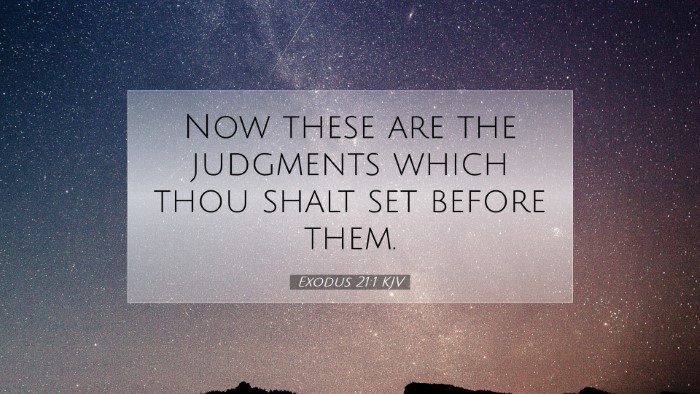Commentary on Exodus 21:1
Introduction
Exodus 21:1 serves as a pivotal verse in the legal code of the Israelites, reflecting the divine order and justice prescribed by God. This verse reads: "Now these are the judgments which thou shalt set before them." This declaration establishes a transition from the narrative of liberation in Exodus to the detailed legislative context that follows, encompassing moral, civil, and ceremonial laws intended for the community of Israel.
Historical Context
The significance of Exodus 21:1 lies in its positioning within the broader narrative of Exodus, where God has recently delivered Israel from Egyptian slavery—an act of divine intervention and covenantal relationship. As the Israelites prepare to enter the Promised Land, it's crucial that they are equipped with the laws and principles that will guide their new society. The laws following this verse are practical applications of the covenantal relationship between God and His people.
Interpretative Insights
The commentaries by Matthew Henry, Albert Barnes, and Adam Clarke provide profound insights into this verse, emphasizing its theological implications and its practical application in the life of the community.
Matthew Henry's Perspective
Matthew Henry highlights that the judgments referred to in the verse are not arbitrary but stem from God’s holiness and justice. His exegesis draws attention to the nature of God's law as authoritative and redemptive. Henry suggests that these laws serve to distinguish the people of Israel from pagan nations, establishing a framework for righteousness that reflects God's character.
- Divine Authority: The very essence of the laws is rooted in God’s sovereignty. By stating “thou shalt set before them,” there is an implication of a structured approach to governance that is divinely ordained.
- Moral Framework: The laws provide moral guidelines essential for maintaining societal integrity and justice. Henry delineates that justice is a critical attribute of God's nature, and His laws are designed to reflect that justice among His people.
- Community and Responsibility: The laws are not merely individual mandates but communal standards that foster responsibility towards one another in the community.
Albert Barnes' Commentary
Albert Barnes elaborates on the term “judgments” as referring to the legal decisions and moral imperatives that would govern the Israelites' social life. He emphasizes that these judgments are comprehensive, addressing various aspects of human interaction and the maintenance of order.
- Social Justice: Barnes asserts that these laws underline the importance of social justice. They aim at ensuring fairness and caring for the vulnerable, such as slaves and the poor, reflecting God's concern for the marginalized.
- Principle of Equity: The principles embedded within these judgments highlight God’s expectation for His people to act justly, love mercy, and walk humbly with Him.
Adam Clarke's Observations
Adam Clarke provides a detailed analysis of the phrase “set before them,” indicating an active role for Moses as a mediator. Clarke discusses the implications of presenting these laws, emphasizing their purpose in instilling a deep reverence for God's order and the covenant:
- Mediation and Authority: Clarke points out the importance of Moses in conveying God's laws, as it reinforces the authority of the divine message. The responsibility of teaching the laws lies with the leaders who are to model and uphold these standards.
- Emphasis on Learning: The requirement to “set before them” also highlights the necessity for teaching and understanding. It indicates that the community must be educated about these laws so that they can live righteously.
Theological Implications
The verse encapsulates critical theological themes relevant to the broader narrative of redemption throughout Scripture:
- The Sovereignty of God: God establishes these judgments, underscoring His ultimate authority and the submission that is expected from His people.
- Covenantal Relationship: The laws are a direct reflection of the covenant relationship, fleshing out what it means to be God's chosen people. Living according to these laws signifies a faithful response to God’s grace and deliverance.
- Preparation for Community Life: These laws are a precursor to the establishment of a just society, implying that ethical living is central to community existence under God's rule.
Practical Applications
For pastors and theologians, the insights gained from Exodus 21:1 and its surrounding context can serve as practical guidelines for contemporary application:
- Moral Instruction: Modern leaders can draw from these laws to instruct their congregations on principles of justice and ethical living, ensuring that church communities reflect the character of Christ.
- Community Engagement: The emphasis on social justice calls today's believers to advocate for the marginalized and to engage actively in societal issues, mirroring God’s concern for justice.
- Education in the Word: The call to teach and set forth God’s judgments reminds church leaders of the importance of biblical literacy and the need to instruct their members in the ways of righteousness.
Conclusion
Exodus 21:1 is not merely an introduction to the judgments that follow but a profound statement about the nature of God’s law and governance. Through the lenses of esteemed commentaries, we see how this verse lays the groundwork for understanding divine law as a means of fostering a just, moral, and equitable society among the people of Israel. As such, the reflections provided can guide pastors, students, and scholars in their pursuit of understanding God’s will for His people both in ancient times and the present.


